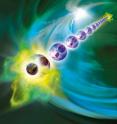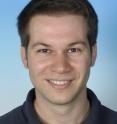Exotic quantum states: A new research approach
Theoretical physicists of the University of Innsbruck have formulated a new concept to engineer exotic, so-called topological states of matter in quantum mechanical many-body systems. They linked concepts of quantum optics and condensed matter physics and show a direction to build a quantum computer which is immune against perturbations. The scientists have published their work in the journal Nature Physics. Three years ago a research team led by Sebastian Diehl and Peter Zoller presented a completely new approach to engineer quantum states in many-body systems. They used a physical phenomenon that normally increases the degree of disorder in a system dramatically: dissipation. In classical physics dissipation is the concept that explains the production of heat through friction. Surprisingly, in quantum physics dissipation can also lead to order and a completely pure many-body state can be realized. This spring an Innsbruck research team, led by experimental physicist Rainer Blatt, demonstrated experimentally that by using dissipation certain quantum effects can be generated and intensified.
By linking concepts of quantum optics and condensed matter physics, theoretical physicists from the Institute of Theoretical Physics of the University of Innsbruck and the Institute for Quantum Optics and Quantum Information of the Austrian Academy of Sciences have now pointed out a new direction of how dissipation may be used in another beneficial and promising way.
Immune against perturbations
In condensed matter physics a new concept to describe order in many-body systems has gained in importance recently: topological order. Two examples for topological phenomena are the quantum Hall effect, which was demonstrated in the 1980s, and the topological insulator, which behaves as an electrical insulator in its interior while permitting the transport of charges on its surface. Sebastian Diehl and Peter Zoller's team of theoretical physicists now suggest realizing dissipation induced Majorana fermions in a quantum system. This topological phenomenon was named after the Italian physicist Ettore Majorana and describes particles that are their own anti-particles.
"We show a new way of how Majorana fermions may be created in a controlled way in a quantum system," explains Sebastian Diehl. "For this purpose we use a dissipative dynamic that drives the system into this state in a targeted way and compels it back when affected by disturbances." With this new approach Diehl and his team combine the advantages of dissipation and topological order -- both concepts are highly robust against perturbations such as disorder. Therefore, their suggestion to create Majorana fermions in an atomic quantum wire is of high interest for experimental implementation. It may be used for building a quantum computer whose basic building blocks consist of Majorana fermions. In quantum wires atoms are confined to one-dimensional structures by optical lattices which are generated by laser beams: Majorana fermions are then generated at both ends of the atomic chain.
Checklist
START awardee Sebastian Diehl and his research group have linked the knowledge of condensed matter physics and quantum mechanics. "We work at the interface between those two disciplines, which creates exciting new possibilities," says Diehl. First though, they had to prove beyond all doubt that the concept of topological order can be transferred to a dissipative context at all. "We were able to tick off all points on the topological checklist and show that its prerequisites are also valid in a system with dissipative dynamics." The physicists have published the mathematical proof of this new approach in the journal Nature Physics.
Source: University of Innsbruck
Other sources
- NOAO telescopes played major role in Nobel-prize winning projectsfrom PhysorgWed, 5 Oct 2011, 22:00:33 UTC
- Nobel Prize 'Inevitable' for Accelerating Universe Discovery, Physicists Sayfrom Live ScienceWed, 5 Oct 2011, 16:31:31 UTC
- Israel celebrates after chemistry Nobel winfrom PhysorgWed, 5 Oct 2011, 15:30:31 UTC
- Iowa State, Ames Laboratory, Technion Scientist Wins Nobel Prize in Chemistryfrom Newswise - ScinewsWed, 5 Oct 2011, 14:30:31 UTC
- The 2011 Nobel Prize in Chemistry Honors Discoverer of Quasicrystalsfrom Scientific AmericanWed, 5 Oct 2011, 13:30:42 UTC
- 2011 Nobel Prize in Chemistry: 'Quasicrystals' once thought impossible have changed understanding of solid matterfrom Science DailyWed, 5 Oct 2011, 13:30:19 UTC
- Unusual crystal patterns win chemistry Nobelfrom Sciencenews.orgWed, 5 Oct 2011, 12:10:12 UTC
- Israeli Scientist Wins Nobel Prize for Chemistryfrom NY Times ScienceWed, 5 Oct 2011, 11:40:06 UTC
- Daniel Shechtman wins Nobel chemistry prizefrom MSNBC: ScienceWed, 5 Oct 2011, 11:00:21 UTC
- Daniel Shechtman wins Nobel chemistry prizefrom PhysorgWed, 5 Oct 2011, 11:00:18 UTC
- Shechtman wins 2011 chemistry Nobel for atom pattern workfrom Reuters:ScienceWed, 5 Oct 2011, 10:40:09 UTC
- Nobel prize in physics 2011 announced - videofrom The Guardian - ScienceWed, 5 Oct 2011, 10:30:32 UTC
- Nobel win for crystal discoveryfrom BBC News: Science & NatureWed, 5 Oct 2011, 10:30:29 UTC
- Israeli wins chemistry Nobel for quasicrystalsfrom CBC: Technology & ScienceWed, 5 Oct 2011, 10:30:15 UTC
- Dark energy discovery wins physics Nobelfrom UPIWed, 5 Oct 2011, 7:01:14 UTC
- Physics 'error' leads to Nobel prizefrom LA Times - ScienceWed, 5 Oct 2011, 4:00:29 UTC
- Nobel in Physics Goes to Perlmutter, Schmidt and Riessfrom NY Times HealthWed, 5 Oct 2011, 3:40:05 UTC
- Dark energy discovery wins physics Nobelfrom UPITue, 4 Oct 2011, 22:30:27 UTC
- Nobel Prize 'Inevitable' for Accelerating Universe Discovery, Physicists Sayfrom Space.comTue, 4 Oct 2011, 22:00:20 UTC
- Nature of universe is still a mystery to Nobel winnersfrom PhysorgTue, 4 Oct 2011, 22:00:15 UTC
- Nobel Prize 'Inevitable' for Accelerating Universe Discovery, Physicists Sayfrom Live ScienceTue, 4 Oct 2011, 22:00:13 UTC
- How Did Nobel-Winning Physicists Discover the Expanding Universe's Accelerationfrom Space.comTue, 4 Oct 2011, 21:30:53 UTC
- Nobel originsfrom Harvard ScienceTue, 4 Oct 2011, 21:10:14 UTC
- Studies of cosmic expansion win physics Nobelfrom MSNBC: ScienceTue, 4 Oct 2011, 19:30:40 UTC
- Nobel Prize in Physics: What's Making the Universe Accelerate?from National GeographicTue, 4 Oct 2011, 19:30:29 UTC
- California physicist shares 2011 Nobel Prizefrom PhysorgTue, 4 Oct 2011, 19:00:28 UTC
- California physicist shares 2011 Nobel Prizefrom AP ScienceTue, 4 Oct 2011, 19:00:18 UTC
- Nobel prize for discovery that the universe is accelerating into the voidfrom The Guardian - ScienceTue, 4 Oct 2011, 16:31:09 UTC
- Video: Nobel Prize in Physics goes to three Americansfrom CBSNews - ScienceTue, 4 Oct 2011, 16:30:58 UTC
- Dark Energy Wins Nobel Prize in Physicsfrom PopSciTue, 4 Oct 2011, 16:30:26 UTC
- Cosmic acceleration discovery wins physics Nobelfrom Sciencenews.orgTue, 4 Oct 2011, 16:10:07 UTC
- Astrophysicist Adam Riess Wins the 2011 Nobel Prize in Physicsfrom Newswise - ScinewsTue, 4 Oct 2011, 15:30:26 UTC
- 2011 Nobel Prize in Physics: Discovery of expanding universe by observing distant supernovaefrom Science DailyTue, 4 Oct 2011, 14:30:27 UTC
- Explosive Studies of Universe's Expansion Win Nobel Prize in Physicsfrom Space.comTue, 4 Oct 2011, 14:00:22 UTC
- Explosive Studies of Universe's Expansion Win Nobel Prize in Physicsfrom Live ScienceTue, 4 Oct 2011, 13:30:20 UTC
- Nobel Prize in Physics Goes to Perlmutter, Schmidt and Riess for Work on Expanding Universefrom NY Times ScienceTue, 4 Oct 2011, 12:50:10 UTC
- Dark-energy pioneers scoop Nobel prizefrom Physics WorldTue, 4 Oct 2011, 12:31:48 UTC
- Discovery of Accelerating Universe Wins 2011 Nobel Prize in Physicsfrom Scientific AmericanTue, 4 Oct 2011, 12:30:50 UTC
- Md. prof shares physics Nobel for universe findfrom PhysorgTue, 4 Oct 2011, 12:00:36 UTC
- Md. prof shares physics Nobel for universe findfrom AP ScienceTue, 4 Oct 2011, 12:00:31 UTC
- Dark energy discovery wins physics Nobelfrom Sciencenews.orgTue, 4 Oct 2011, 11:50:07 UTC
- Studies of universe's expansion win physics Nobelfrom MSNBC: ScienceTue, 4 Oct 2011, 11:00:31 UTC
- 3 U.S.-born physicists win Nobel Prizefrom CBSNews - ScienceTue, 4 Oct 2011, 11:00:21 UTC
- Nobel for expanding Universe findfrom BBC News: Science & NatureTue, 4 Oct 2011, 10:30:26 UTC
- Perlmutter, Schmidt, Riess win Nobel Prize in Physicsfrom CBC: Technology & ScienceTue, 4 Oct 2011, 10:30:19 UTC
- Three win 2011 physics Nobel for universe expansion workfrom Reuters:ScienceTue, 4 Oct 2011, 10:20:10 UTC
- Perlmutter, Schmidt, Riess win Nobel physics prizefrom PhysorgTue, 4 Oct 2011, 10:00:18 UTC
- Quantum physics is the focus of Nobel buzzfrom PhysorgTue, 4 Oct 2011, 8:31:19 UTC
- Quantum physics is the focus of Nobel buzzfrom AP ScienceTue, 4 Oct 2011, 7:30:16 UTC
- Quantum physics is the focus of Nobel buzzfrom MSNBC: ScienceTue, 4 Oct 2011, 1:00:42 UTC
- Exotic quantum states: A new research approachfrom Science DailyMon, 3 Oct 2011, 16:32:04 UTC
- Exotic quantum states: A new research approachfrom PhysorgMon, 3 Oct 2011, 10:00:34 UTC

